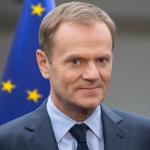
Donald Tusk, President of the European Council, has written a report in which he looks back at the European Council’s work since he took up office on 1 December 2014, and provides his personal account of the main decisions taken by European leaders since then.
Following is an extract about the UK and Europe looking for positive and constructive solutions. It does not mention the destructive expression of “brexit”.
“Last November, I received a letter from Prime Minister Cameron setting out four specific areas in which the United Kingdom is seeking and proposing reform: on economic governance, on competitiveness, on sovereignty, and on social benefits and free movement.
In response to the Prime Minister, I made it crystal clear from the very beginning of the process: we would do all in our power to meet Britain’s concerns but we must not compromise the values and basic principles of the European Union, including — but not only — freedom of movement and non-discrimination. My initial consultations with all other member states fully confirmed this stance although there was also great good will to find a solution that would secure Britain as an EU member. I aimed at settling the matter as quickly as practicable.
After consulting more widely, I first set out in detail the possible terms of a UK re-negotiation in a letter to leaders in early February 2016. I then undertook an exacting schedule of visits to national capitals around the European Union to hear individual concerns on a draft text. Even with this careful preparation, the February European Council that followed was as difficult as any of my term. During our long and often heated discussions, we haggled over the smallest details of the deal. It was not an aesthetic spectacle, and far from glamorous. But the important point was that no member state walked away from the table.
In the end, the 28 heads of state or government unanimously agreed and adopted a legally binding and irreversible settlement for the United Kingdom in the EU. We agreed to do this in a way that does not compromise the European Union’s fundamental values such as the freedom of movement or the principle of non-discrimination, and without compromising the future development of the Economic and Monetary Union. The deal recognises, strengthens and protects Britain’s special status in the European Union. But it does not do this at the expense of others.
Even though we found a common solution in the end, the real test is ahead of us. Only the British people can and will decide the future of the United Kingdom in the European Union. It is my dearest hope that they agree to stay, as there is so much potential benefit for the EU and the UK in remaining together, both in terms of our mutual prosperity and security in the world. I am deeply committed to seeing that potential realised and look forward to working with an engaged Britain in a reformed European Union.”
